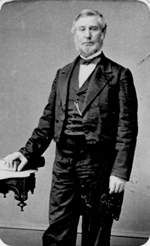Jacob M. Howard | |
|---|---|
 | |
| United States Senator from Michigan | |
| In office January 17, 1862 – March 3, 1871 | |
| Preceded by | Kinsley S. Bingham |
| Succeeded by | Thomas W. Ferry |
| Attorney General of Michigan | |
| In office 1855–1860 | |
| Governor | Kinsley S. Bingham Moses Wisner |
| Preceded by | William Hale |
| Succeeded by | Charles Upson |
| Member of the U.S. House of Representatives from Michigan's at-large district | |
| In office March 4, 1841 – March 3, 1843 | |
| Preceded by | Isaac E. Crary |
| Succeeded by | Robert McClelland |
| Member of the Michigan House of Representatives | |
| In office 1838 | |
| Personal details | |
| Born | Jacob Merritt Howard July 10, 1805 Shaftsbury, Vermont |
| Died | April 2, 1871 (aged 65) Detroit, Michigan |
| Resting place | Elmwood Cemetery, Detroit, Michigan |
| Political party | Whig (before 1854) Republican (after 1854) |
| Spouse | Catherine Amelia Shaw (1810–1866) (m. 1835–1866) |
| Children | 7 |
| Education | Williams College |
| Profession | Attorney |

Jacob Merritt Howard (July 10, 1805 – April 2, 1871) was an American attorney and politician. He was most notable for his service as a U.S. Representative and U.S. Senator from the state of Michigan, and his political career spanned the American Civil War.
Howard was a native of Shaftsbury, Vermont, and attended schools in southern Vermont before attending Williams College, from which he graduated in 1830. He studied law, moved to Detroit in 1832, and attained admission to the bar in 1833. Howard practiced in Detroit and became active in politics, first as a Whig, and later as a Republican. Among the offices he held were city attorney (1834) and member of the Michigan House of Representatives (1838). In 1840 he was elected to the U.S. House, and he served one term, 1841 to 1843. In 1854 he was one of the founders of the Republican Party, and he served as Michigan Attorney General from 1855 to 1861.
After Senator Kinsley S. Bingham died in 1861, Howard was elected to fill the vacancy, taking office in January 1862. He was elected to a full term in 1865, and served until March 1871. From 1863 to 1871, Howard was chairman of the Senate's Committee on Pacific Railroads.
Howard died April 2, 1871, a month after the expiration of his final Senate term. He was buried at Elmwood Cemetery in Detroit.